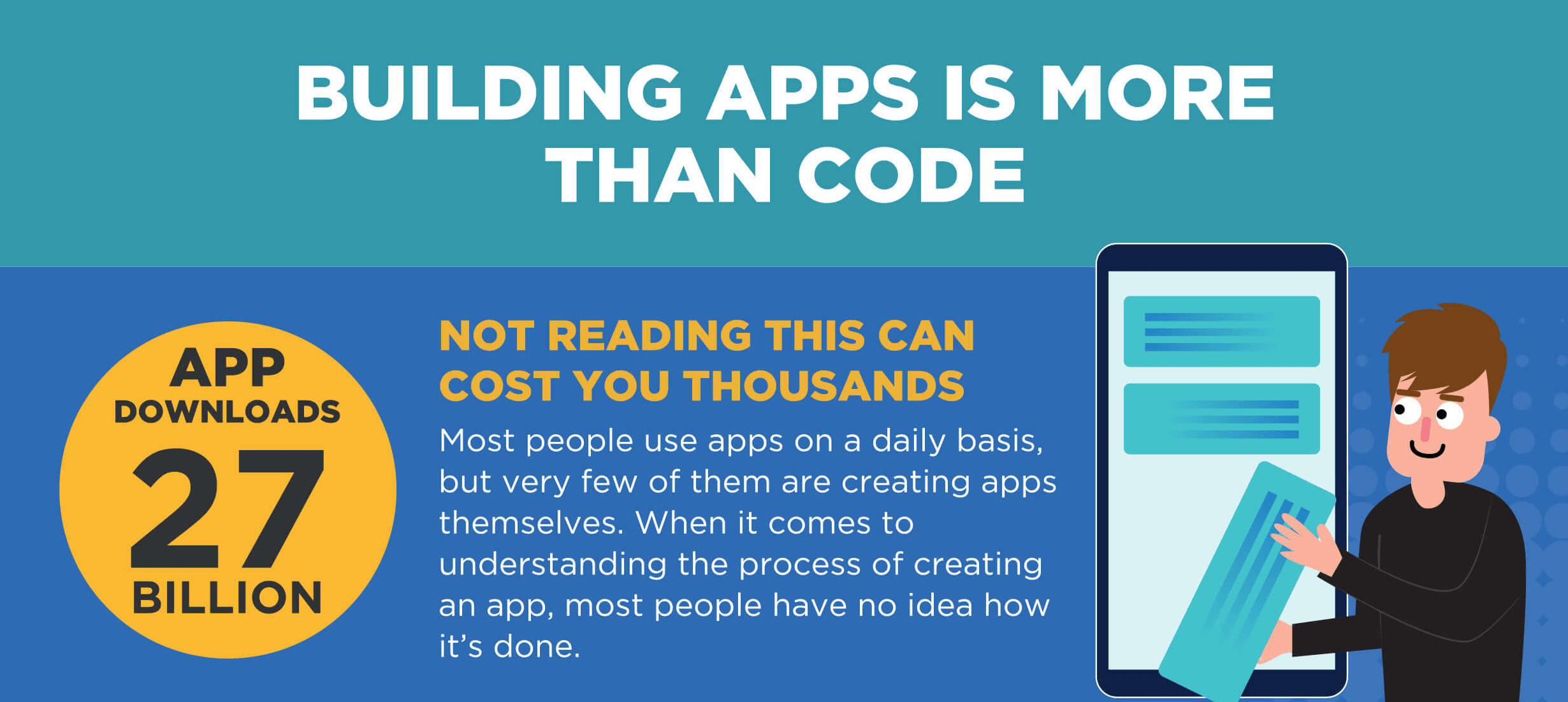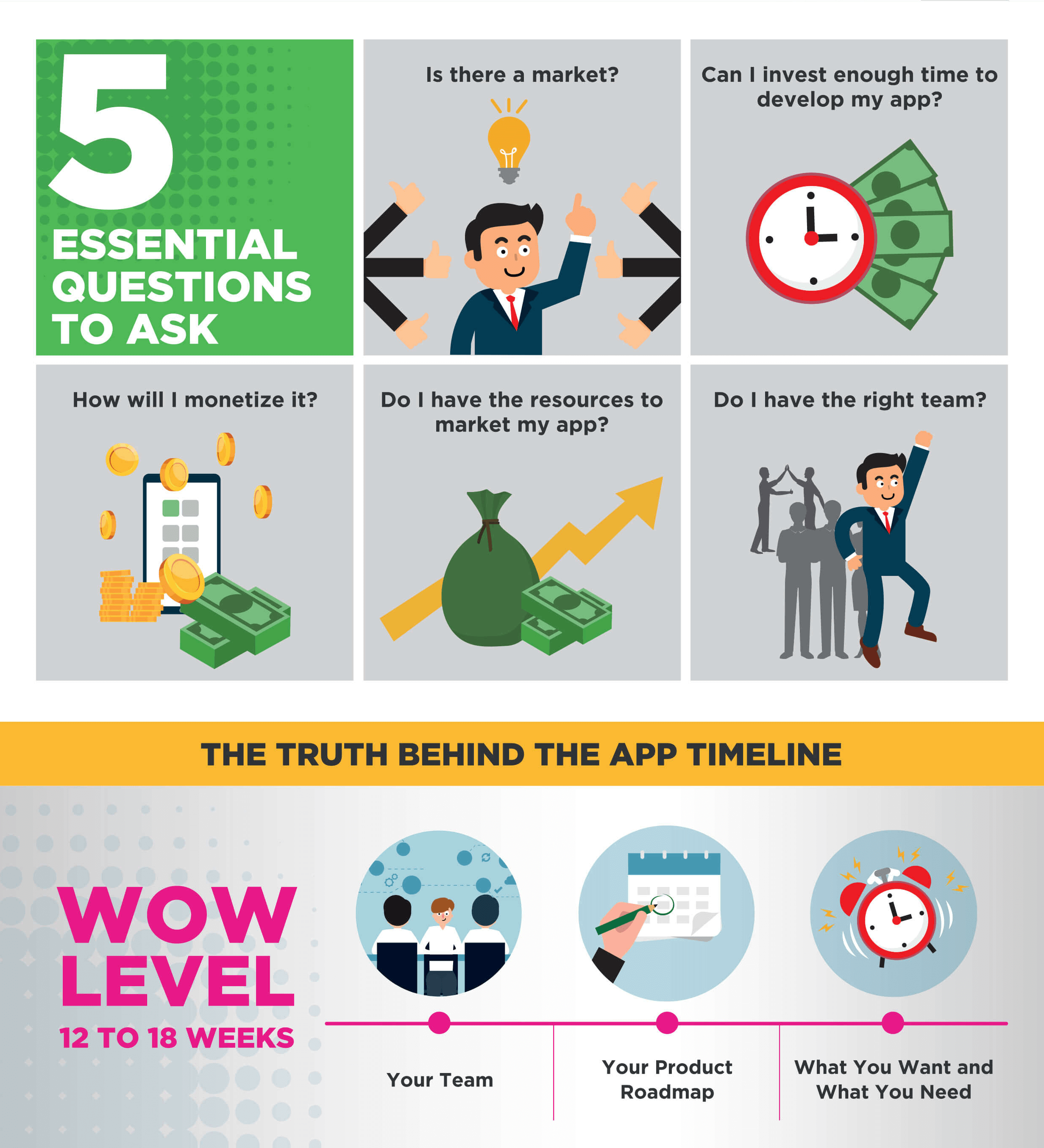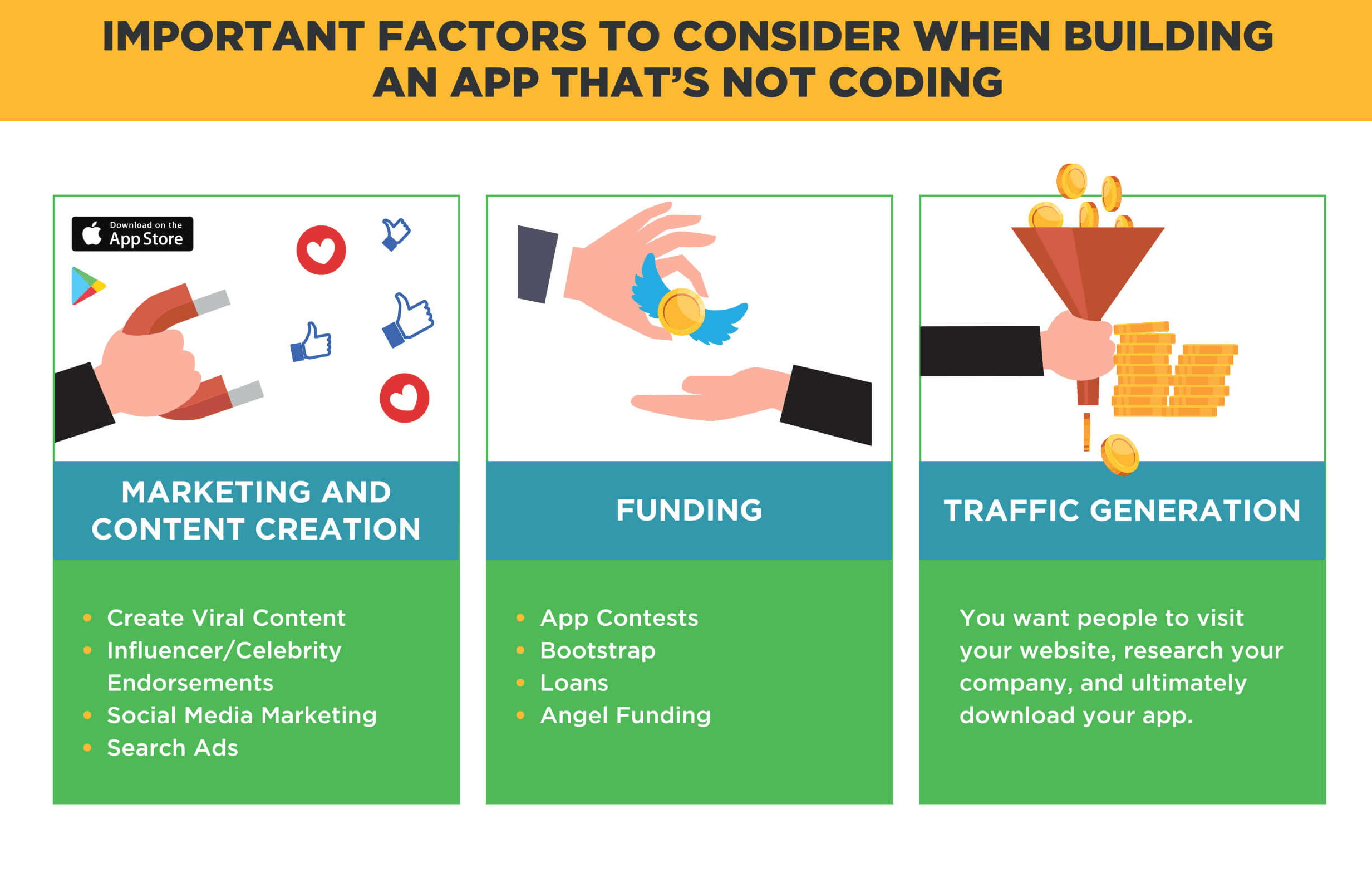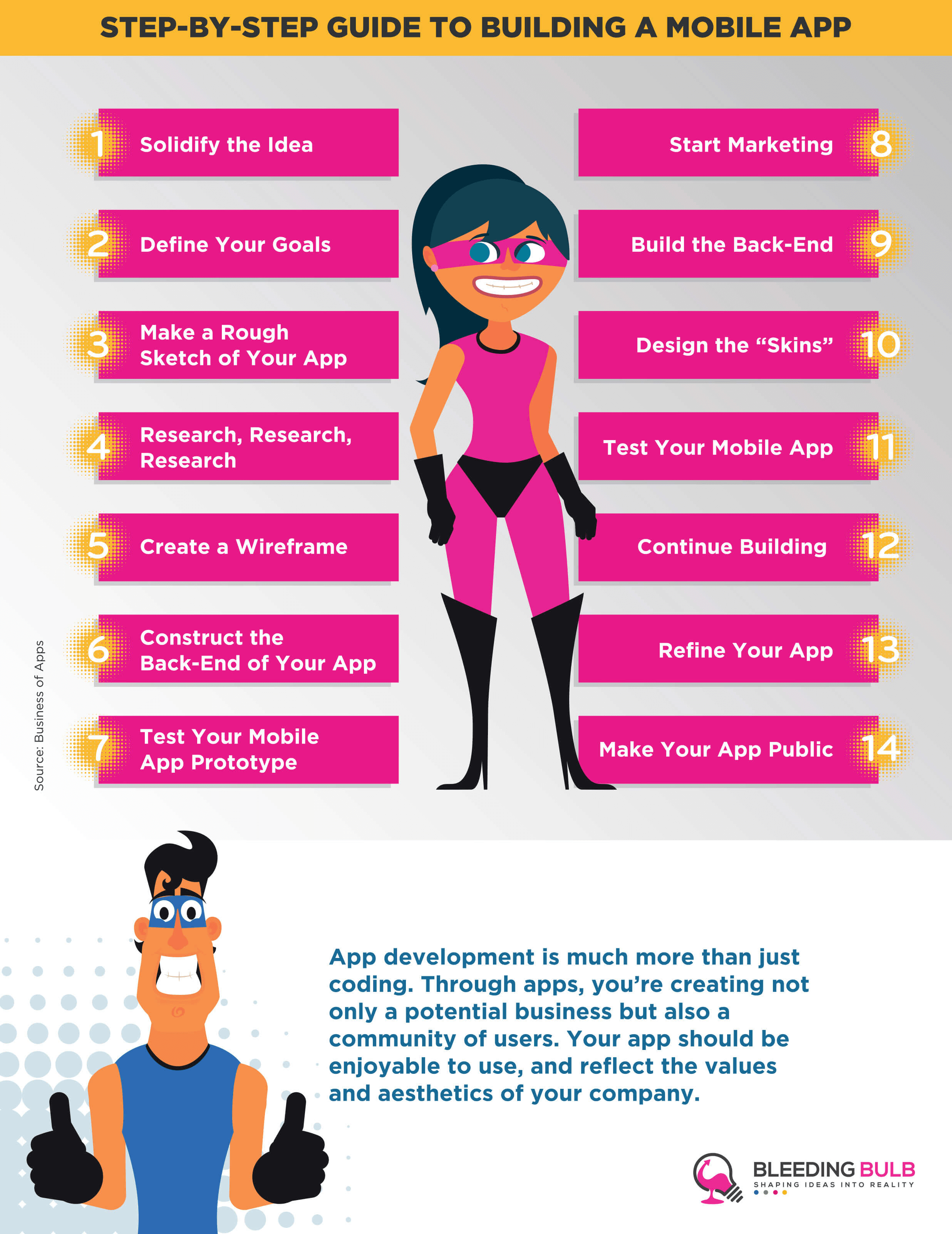5 Essential Questions to Ask Yourself Before Developing an App
The Truth Behind the App Timeline
Non Coding Factors to Consider When Building an App
Step-by-Step Guide to Building a Mobile App
Introduction
Most people use apps on a daily basis, but very few of them are creating apps themselves. When it comes to understanding the process of creating an app, most people have no idea how it’s done. It’s assumed that developers code the app, the app is completed, and we all rush to download it. In reality, there are thousands of apps available that are barely receiving any attention. This is because, when it comes to building an app, it’s more than code.
If you have a couple of app ideas floating around in your head and you’re considering making an app, it’s important to truly understand what goes into creating an app. Though coding is a huge part of the app creation, there are other fundamental factors you’ll need to focus on if you want your app to be a success.

5 Essential Questions to Ask Yourself Before Developing an App
Apps are everywhere, but this doesn’t mean your app will become a hit. Thanks to low-code app development platforms, even people with minor coding experience can put their ideas on paper. Before investing any money into developing your app, you need to ask yourself some crucial questions; and of course, know the answers. This will help you truly see whether or not your app has a chance of making it big.
1. Is there a market?
Though you may think your app idea is a good one, is there a market for it? This is a hard question to ask yourself as it’s easy to let your ego get in between you and reality. If there’s an existing market, that’s okay, it shows your idea is valid. The next step is seeing how you can make your app different and fill the holes in the marketplace. Don’t get discouraged if there are existing apps, if anything, this should inspire you.
2. Can I invest the time into developing my app?
Many people assume that building an app doesn’t take a lot of time. But in reality, it’s very time consuming if you’re taking it seriously. Even if your app does do well, it won’t achieve success overnight. Before investing any time or money in your app, think honestly about it. Are you ready to make a significant commitment?
3. How will I monetize it?
If you have the time and resources to make an app for fun, that’s great. However, for the rest of us, building an income from the app is one of the main reasons why you’re creating it. In reality, less than 1% of apps are profitable and the other 99% are not making enough money to break even.
As an app founder, you’ll need to find a way to monetize your app and give your customers a valid reason as to why they should pay for it. Even if you’re not planning on monetizing your app, you should always have a strategy in place - you don’t know the level of success your app will receive.
4. Do I have the resources to market my app?
If you don’t market your app, no one is going to see it. There are thousands of apps on the market that aren’t getting the attention they deserve. Why is that? Because there aren’t enough dedicated enough resources to market them. You don’t need millions of dollars to market your app, but you will definitely need a marketing budget. If you choose to hire an agency to do it for you, this will be costly. If you choose to market the app on your own, you’ll need to dedicate a decent amount of your time to it. Be realistic and identify how you’re going to be marketing your app. Then, you’ll be able to create a marketing plan.
5. Do I have the right team?
If you don’t know how to code, you’re going to need to hire an app developer. This means you’ll need to find someone with the skills and capabilities to take your ideas and make them tangible. If you don’t have the right app developer, you run the risk of your app underperforming or taking forever to complete. A great product is nothing without the team who built it. Focus on making sure you have the right team that will support your ideas and make a product that works.
By answering these questions, you’ll have a better idea of whether or not you should develop an app. If you aren’t able to monetize or market it, it won’t be a sound investment. However, if you have the answers to these questions, then you have the green light to pursue your app.

The Two Sides to Every App
When it comes to apps, there are two sides developer are going to work on. Naturally, there is the app itself which includes front-end and back-end development. The back-end focuses on the application’s server, database, and application. Essentially, the back-end is the actual foundation of the app. The front-end is what users see and interact with, consists of web design and web development.
Then there’s the other side, the side which developers and app founders tend to focus on last (even though they shouldn’t). This side focuses on the usage of the app and includes marketing, content, and traffic generation. Without making a name for the app in the public space through marketing and content, the app will fall into obscurity. Sadly, many developers do not take an interest in this side until after the development of the app. However, both sides need to grow together. If you develop an app and only then start to market and create content, your app won’t receive attention for months. Both sides of app development rely on each other and need to gain momentum cohesively during the development process.
The Truth Behind the App Timeline
Everyone wants their app to be built quickly. Not only are you excited to see the finished product, but you want hit the market as quickly as possible. Who knows what apps your competition is developing, and the pressure is on. When developing an app, the truth is: it takes a long time. If you want to build an app quickly, it’ll probably be bad. Usually, these apps are built without real effort and are full of bugs. You don’t want an app that’s going to get bad reviews, you want an app that’s going to wow the public.
To get to that level, the app will probably need thousands of hours of work. Naturally, your budget will play a huge factor in the number of hours you can invest in the creation of your app. However, realistically, you’re not trying to make Tinder or Instagram. Your app should take between 12 to 18 weeks, depending on the app. There are some factors which influence the timeline of your app.
Factor 1: Your Team
Do you already have experience in app building or are you new to app development? Your level of knowledge will certainly affect the timeline of the app. If you’re coming from experience, you may have coding skills or the right trustworthy connections to get you developing your app quickly and efficiently.
If you have no experience, you will need to take time to choosing your team and to gain a fundamental understanding of the app building process. For example, you’ll have to learn about the differences between native vs hybrid vs progressive apps as you’ll have to decide which approach to take. You’ll hit many bumps along the road and depending on your level of experience, overcoming the obstacles may take more or less time.
Factor 2: Your Product Roadmap
Though the app is an essential part of the process, you also need to attract users to it. You may be asking your developers how long it’ll take to complete the app, but your job isn’t over just because your app is live. When it comes to a timeline, it’s important to understand your product roadmap and the plan you’re going to take. If you don’t have a detailed plan, your timeline will continue to get pushed back. Knowing the steps of app development will help you create deadlines and goals.
Factor 3: What You Want and What You Need
You may want a specific feature on your app or to change the layout, but in reality, it’s not possible. In addition, you’ll face many questions which will determine the timeline of your app. Do you have an existing website with products that need to be integrated into the app? Will there be chat features? Analytics? You may want these features, but be warned that this will prolong the process.

Non Coding Factors to Consider When Building an App
Of course, you want to create a successful app, who doesn’t? Remember when we talked about the two sides of an app? You have the actual app itself and then you have your tugboat, pulling it along on its journey. This includes marketing, funding, and traffic generation. These factors greatly determine the success of the app, and have nothing to do with code.
Marketing and Content Creation
Making an app is one thing, but that’s only half the job. The real work comes when you have to market the app. Your app may be the best app out there, but if people aren’t discussing it, then it’s pointless. To have a chance of any level of success, you’re going to need to test out various marketing strategies:
Create Viral Content
When it comes to the internet, content is king. If you want to create a buzz around your app, you’re going to need content. Content marketing gives potential users information regarding your app and company. Essentially, it builds brand trust. If people trust your app, they’re more likely to purchase it.
Influencer/Celebrity Endorsements
When it comes to advertising, celebrities have the power to elevate a product’s popularity. You may not have the budget for a Kim Kardashian endorsement, however, you can use local celebrities or influencers to advertise your product. Having a well-known face promote your app can attract a whole lot of of users.
Social Media Marketing
Whatever your marketing budget, social media is a great way to spread the message about your app. Through organic and paid advertising, you’ll be able to use social media platforms to engage with potential app users. For example, Facebook Ads allows you to customize your ads and target specific audiences.
Search Ads
You will want to be selling your app in Apple and Google Play stores. Both Apple and Google Play offer Search Ads. Search Ads are essentially paid advertising. You can bid on specific keywords and increase your search position.
Funding
We all have great ideas for apps, but the reality is that not everyone has the money needed to make one. When it comes to investors, ideas are meaningless unless they translate to downloads or sales. If you can fund your own app, that’s great. If you can’t, then you’re going to need to get the money from elsewhere. Here are some ways of finding funding for your app:
App Contests
Who doesn’t love a good contest? There are various app contests that provide winning apps with money to fund their development. Many of these contests are designed by angel funds and investors. There’s no doubt that these contests are highly competitive, but if your app is amazing, you might have a chance.
Bootstrap
If you’re looking for a way to save yourself from taking out a loan, then bootstrap. This means raising money through your existing job or using your savings. If you plan well enough in advance, you can set aside some money every month which will go directly into funding your app. This way, you reduce the amount of money you’ll need to borrow from the bank or friends and family.
Loans
Apps aren’t cheap if you want to build a decent one. Banks will provide small loans to entrepreneurs who have solid business plans. Make sure your business plan includes market research, revenue projections, and a timeline. Banks aren’t just going to blindly give you money, they want to see proof that they’re going to get it back.
Angel Funding
There are various angel funds which consist of people who invest in an idea which hasn’t materialized yet. If you propose your idea on paper and people like it, they’ll invest in it. It’s best if you produce a prototype, showing people how it will work. This gives your idea more credibility and trust.
Traffic Generation
You want people to visit your website, research your company, and ultimately download your app. This means you’re going to need to generate traffic to your website and app. Of course, you’re going to market your app via social media, search ads, and content. You’re also going to need to understand analytics.
Analytics don’t generate traffic as such, but they monitor and record the data of your users. Marketing will push people to view your app, but you need to understand your audience first. That way, you’ll be able to create a strategy to generate the right traffic to your product. You don’t need one million people to see your app, you need one million downloads.
When it comes to finding the money for your app, that’s all up to you. No one is going to hand you a blank cheque, if you want the app to become a reality, you’ll need to chase the money. If you already figured that part out, it looks like you’re all set to get started.

Step-by-Step Guide to Building a Mobile App
Now that you know everything that goes into building an app, how do you build one? We’re going to break it down and show you, step-by-step, how to build a mobile app.
1. Solidify the Idea
Before even creating a mobile app, you need to have a concept. It doesn’t have to be a structured idea, you will create the structure afterwards. What you do need is a rough concept of what you want your app to do. Forget about the looks right now - what is your app going to provide to users? Is it a dating app? Organizational app? Once you have a basic idea, you’ll easily be able to improve on it.
2. What Are Your Goals?
A great idea is the start of any project, regardless of the industry. Before you do anything, you need to define what’s the purpose and goal of your mobile app. If your ideas and goals aren’t defined, then you run the risk of prolonging the process or not completing the project. Make sure you have a very clear idea of what your app will provide its users and how it’ll improve their lives.
3. Make a Rough Sketch of Your App
You have probably already thought about the design of your app, but now it’s time to put it on paper. On a piece of paper, draw out a rough sketch of what the app layout will look like. This will allow your team to have a better understanding of what you’re looking for, leading them in the right direction.
4. Research, Research, Research
There’s no way around this, you’re going to have to do a lot of research. Through your research, you need to focus on these four areas:
1) Inspiration for your app’s design
2) How you can market and monetize your app
3) Are there other apps on the market providing the same service?
4) Technical requirements for your app
In many cases, even though your idea is a good one, similar apps might already be out there. Does this mean your app won’t be successful? No. It just means you’ll need to put more effort into marketing it to the public. With 2.8 million apps available for Andriod and 2.2 million for iOS, the competition is intense. Do your research and know your market like the palm of your hand. This will help you stay focused on your project and create an app that fills a real need.
5. Create a Wireframe
It’s now time to wireframe your app. Wireframing is the process of creating a prototype, and you can use a variety of drag and drop prototype creation programs online. They are easy to use and allow you to play around with the the layout and functionality of your app.
You should also create a storyboard which will map out where each button will lead users. Your app’s navigation must be seamless and easy-to-use if you want it to be a hit with users. It also allows you to have a better viewpoint in case you made any critical errors in your navigation.
6. Construct the Back-End of Your App
The back-end, as we mentioned earlier, is the foundation of your app. In other words, without it, you wouldn’t have one. Once you are happy with the wireframe, your design and navigation is complete. Now you need to implement servers, APIs, and databases. Of course, your developer will be taking on this task and making sure everything is in its right place.
7. Test Your Mobile App Prototype
This is the moment when you show your app to people around you that you trust. Your friends, family members, co-workers, and experts can all provide you with valuable feedback regarding your app. Show them your wireframe and let them explore your app. Ask them for honest feedback. You will need constructive criticism to identify flaws and bugs.
8. Start Marketing
Your mobile app idea is now on paper, and looking more like an actual app than just an idea. You should start marketing right now. Though your back-end isn’t built yet, the face of your app is. If you can market earlier, even better. However, if that’s not possible, now is the perfect time to spread the word about your product and get the buzz going about your app. Try to get your name in tech articles and use visuals on social media to drum up interest.
9. Build the Back-End
While you’re busy marketing your app, your developer should be working on the back-end. Your app is defined, the idea has been ironed out and now you are ready to build the foundation. Your developer, or team of developers, will work on servers, databases, storage solutions, and APIs. Developing the back-end will take a decent chunk of time to complete, depending on the size, skill, and budget of your team.
10. Design the “Skins”
Remember your wireframe? This is the mockup or prototype of your app. Now it’s time for the developer to create high-resolution versions of this prototype. Though this step may sound like a walk in the park, it’s actually a very crucial step.
By designing the skins, your prototype testers are going to be giving you feedback regarding its appearance and functionality. You’ll be able to use their feedback to create the best UI, or User Interface. Let’s face it, if your users don’t like using your app, it’s not going to succeed.
11. Test Your Mobile App
You’ve designed your skins and then tested them on your prototype testers. You have one test out of the way, now it’s time for the second test. Even though your app may look complete, this second round of testing will sniff out small bugs and functionality problems you’re going to have to solve. You can use testing apps that allow you to upload your app’s design and test its flow.
12. Continue Building
You won’t perfect your app in one go. It’s going to take revision upon revision before you end up with a fully functioning app. These revisions will help you to put the final touches on your app. This is a good time to change the layout if needed and your developer will be able to make back-end alterations.
13. Refine Your App
You may think it’s done, but your app will never be completely finished. There will always be something you’ll need to tweak or add to it. Before releasing it to the public, download it on your phone and test it out one last time. Check the functionality, making sure everything is flowing just right. Of course, you’ll be monitoring your app even when it’s online, but this will be the last test before it’s released.
14. Make Your App Public
If you’ve been marketing your app until now, you should already have a following of users that are waiting for your app to be released. If you’re just starting to market your app now, you’ll have to wait a couple of months until people start to take notice. Either way, you need to now make your app available to the public. You’ll be able to add your app onto Google Play right away. However, with Apple, they’ll review and approve your app before allowing it on their store.
Conclusion
To the untrained eye, app development is nothing more than a couple of swipes here and there, and a of couple lines of code. However, app development is much more than just coding. Through apps, you’re creating not only a potential business but also a community of users. Your app should be enjoyable to use, and reflect the values and aesthetics of your company.
App building is never easy, and there are often hidden costs and many hurdles to overcome. By understanding everything that goes into creating an app, you’ll be better prepared during the development process. By knowing what to expect, the process will be a lot smoother. Remember to try and enjoy the journey; you will be creating something out of nothing, and this is quite an accomplishment.


